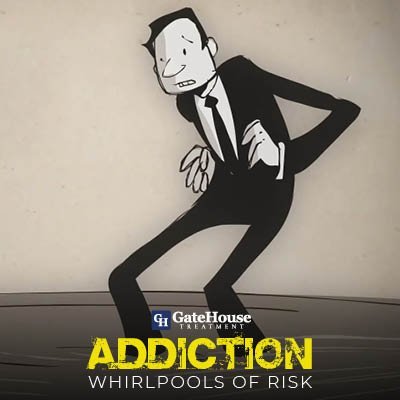
The Addiction Policy Forum has released another episode in The Addiction Series. The second episode in the series is titled “Whirlpools of Risk,” and the video describes how not everyone who uses drugs or alcohol develops a substance abuse disorder. A large contributor to developing a substance abuse disorder are risk factors, and the risk factors can vary from person to person. Risk factors can vary from environmental factors such as poverty and traumatic experiences in your life. Risk factors are also very personalized when it comes to genetics and the age of your first use.
How Risk Factors of Addiction Come into Play
The first use of any substance whether it be alcohol, tobacco or drugs is referred to as initiation in the Whirlpools of Risk video; it’s testing the waters. Imagine placing your toes into a pond, the ripples become the whirlpool, it spins at various speeds, and depending on your risk factors the pool can swirl faster or remain at the same pace. The path to developing a substance use disorder or dependency is laid out in the video.
It goes from initiation to regular use; this is where most people stay. Many people casually consume alcohol but do not have an alcohol use disorder. People may periodically use tobacco products but aren’t addicted to them, this is where the whirlpool can begin spinning faster for some. Those with higher risk factors progress from regular use to problem and risky use. Risky use is when using a substance is starting to affect your daily life, and can start pulling you away from your priorities. It will start taking precedence over things like your friends, family, your job, and important appointments. At this point, the whirlpool is spinning dangerously fast.
What Comes Next?
The next point on the pathway is substance use disorders, addiction, and dependency. Substance use disorders are unfortunately where many people end up before they even realize what has happened. When use has escalated past problematic and risky behavior is when substance use disorders occur. It’s when the person is physically addicted, mentally addicted or dependent on the substance to function normally.
Do the Substances have a Risk Factor?
Some people can still pull themselves away from their substances at this point, depending on what substances they are using. For some, the progression from initial use to substance use disorders is a rapid descent, or it can be a slow sinking process. The substances being used also play a large role in the speed of the progression. All substances have their whirlpools as depicted in the video and they all spin at various speeds; for each individual, the speeds are different.
Many people get into the whirlpool of alcohol and tobacco, but do not develop a substance use disorder, whereas 70% of heroin users will develop a heroin use disorder rapidly. About 9% of people using alcohol develop an alcohol use disorder. When using multiple substances (which many people do), the overall risk of developing a substance use disorder gets higher.
Prevention and Education
Education and prevention go hand in hand when it comes to substance use disorders. Being armed with the proper knowledge about ourselves gives us the chance to make informed decisions. For example, people who have an alcoholic or an addict as parents know first hand what they are predisposed to. Other people grow up with seemingly perfect lives and still turn to drugs and alcohol. This is why having education about drugs and alcohol and how addictions develop is crucial. Many people think that they cannot become addicted after one use, or even recreational use. Recreational use is how it starts for many people who later on develop substance use disorders.
Stay up to date on the Addiction Series episodes to keep educating yourself. If you or someone you know think you may be on the pathway to a substance use disorder, reach out to us here at GateHouse Treatment today at (855) 448-3588. We can help you turn your life around, today.
- Cymbalta Withdrawal: Causes, Symptoms, And Management - October 12, 2023
- Boredom in Recovery: 5 Tips to Avoid Relapse - October 6, 2023
- Overconfidence and Rehab: Avoiding Relapse - October 4, 2023




